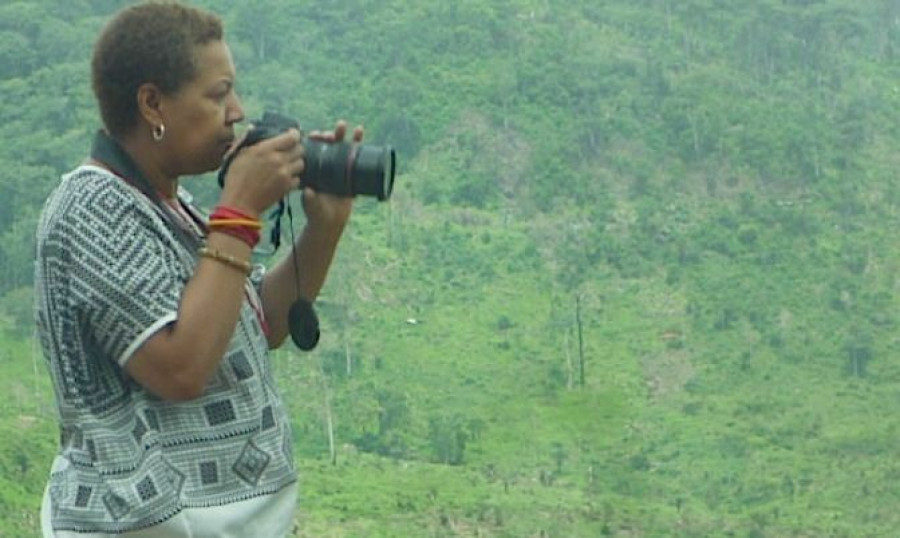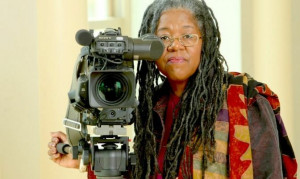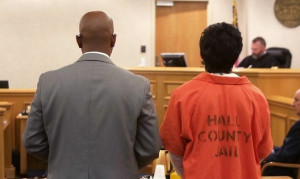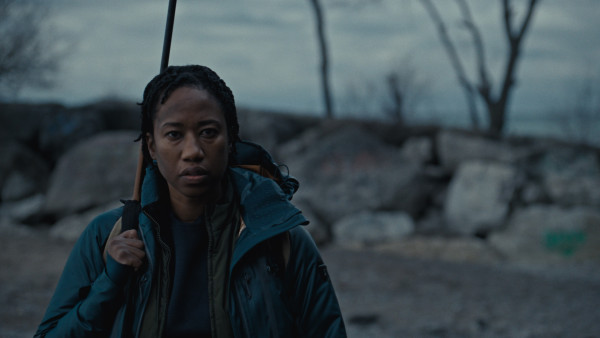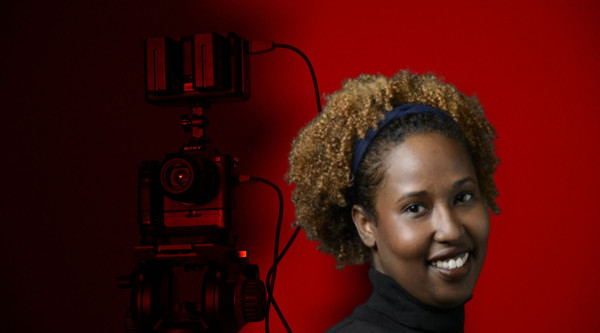Film Title: Positive Women: Exposing Injustice
Filmmaker: Alison Duke
Length: 44 mins
Distributor/Contact: The Canadian HIV AIDs Legal Network
Film Logline/Synopsis: What if you knew you could go to prison for something you couldn’t change?
Screen it here: Positive Women: Exposing Injustice
One of the first observations easily made when screening the work of Alison Duke is the compassion and care for her subjects through the camera lens. Her latest film—a commission by the Canadian HIV AIDs Legal Network—introduces four different women linked by what some suspect would be devastating news of an HIV diagnosis. The use of color, lighting and imagery brings a sensitivity to their stories of which these women may be immune after having to live with their diagnosis every day.
This is Duke’s second film on this topic. Her first HIV/AIDS film was called The Woman I Have Become, focusing on African and Caribbean women living with HIV.
This second project, Positive Women: Exposing Injustice, raises awareness about HIV, the Supreme Court of Canada and the criminal justice system. The brave women who come forward to tell their story have an amazing level of trust in Duke’s vision. And, it is the filmmaker’s treatment of their humanity that transports them beyond their disease and prepares the audience for the collective threat that currently hangs over those afflicted with HIV in Canada: the law.
The slippery slope of how and when to reveal HIV status to a potential mate could now be criminalized. Duke says, “A lot of people are shocked that in Canada we have a law that is really targeting the most vulnerable. The stories are pretty horrific. The law is so hypocritical as it was meant to protect women but is now criminalizing them, especially black men and women.” When it comes to Black women and the disease, Duke feels the law plays a significant role in their inability to seek and receive effective care. She has observed the following: “HIV positive Black women and racialized women face more stigma, because they are doubly stigmatized: first in the larger Canadian society because of their race and secondly because of their HIV status. This level of stigmatization is the driver behind why today Black women in particular have the highest rates of new HIV infections in Canada.” There have been more than 100 screenings of the film across Canada, the US and around the world to date. Duke’s award-winning experience as a storyteller informs our understanding as to how someone could be a disease carrier one day and criminalized the next.
For this film, Duke says she was really inspired by the story of DC, a French Canadian woman, who was arrested and put on trial for not disclosing her status to a man she was trying to break up with after a four-year abusive relationship. Telling her story was quite challenging. According to Duke, “There was a media ban on her case so we couldn’t use her real name or show her face. She originally contracted HIV from her late husband who passed over 10 years prior. DC was subsequently arrested when her abusive boyfriend, in retaliation of her wanting to break up with him, told the police that she did not disclose her HIV status to him when they first had sex. The boyfriend was not infected. She was first charged for not telling her boyfriend, lost the case and was sentenced to prison. But she appealed and won. Thus, the first judge didn't believe she disclosed but the second one did. DC’s case was selected for review by the Supreme Court of Canada in 2012 to set a legal precedent.”
Duke says the law changed slightly but feels “it is nowhere where it needs to be so ironically I have been commissioned to make another documentary for them! And I am making a short film drama inspired by this law.”
Duke’s behind-the-scenes story: I think when you decide to become a documentary filmmaker, you always have to be really organized and have a plan of action. But you also have to know when to embrace spontaneity. You can’t be afraid of the unknown. It is sometimes easier, especially when commissioned to make films for someone else, to play it safe, follow the plan laid out before me. But after doing this for years, now I know, more and more that my most innovative work comes from taking a peek under the covers from time to time. Sorry about the pun, but I encourage everyone who is working with me, to be a bit unconventional once in a while. Let’s have a few days where we go off our plan and see what happens. When you are trying to capture something that is real, you can’t just keep setting it up all the time. You have to look for it. For an audience, you have to understand what feels real, what’s entertainment and what’s just information. It’s a balance.
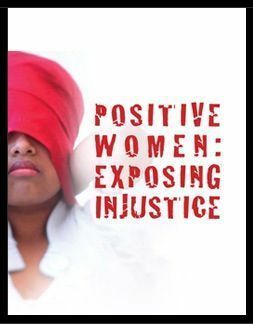 Duke’s biggest challenge: I wanted to recreate the moment that demonstrates the vulnerability of women in intimate situations and how the current law at the time, puts women at a disadvantage when disclosing her status. So I put a call out for actors to play four couples to represent the stories of the four women in the film and in the call I mentioned that the film was about sexual transmitted diseases. I couldn’t believe the response. It was great. About 50 actors submitted bios and headshots. When we followed up with the 8 actors we selected to tell them that the film was about the HIV disclosure and the law and what we wanted them to do, everyone seemed so keen. Then on the day of the shoot only two women showed up, and one didn’t want to show her face. I realized that the stigma was so great that even actors were afraid of being involved. It was pretty devastating. I was frantically trying to re-story board the film at the studio and the one woman who was not afraid, the one who we see throughout with the red scarf said to me... come on lets go... I can do it all... and she did. Working with her was one of the most rewarding creative experiences I’ve had as a director. Some of my other challenges were, that it was difficult to find a HIV positive Caribbean woman to participate, again because of the tremendous stigma and discrimination they face in the community. So I focused on trying to capture their absence...as a way to raise the dialogue about this. That’s what the black women and the scarf represent. It represents the relationship HIV positive women have with their illness and the stigma and discrimination they face and feel. Black women and racialized women face more.
Duke’s biggest challenge: I wanted to recreate the moment that demonstrates the vulnerability of women in intimate situations and how the current law at the time, puts women at a disadvantage when disclosing her status. So I put a call out for actors to play four couples to represent the stories of the four women in the film and in the call I mentioned that the film was about sexual transmitted diseases. I couldn’t believe the response. It was great. About 50 actors submitted bios and headshots. When we followed up with the 8 actors we selected to tell them that the film was about the HIV disclosure and the law and what we wanted them to do, everyone seemed so keen. Then on the day of the shoot only two women showed up, and one didn’t want to show her face. I realized that the stigma was so great that even actors were afraid of being involved. It was pretty devastating. I was frantically trying to re-story board the film at the studio and the one woman who was not afraid, the one who we see throughout with the red scarf said to me... come on lets go... I can do it all... and she did. Working with her was one of the most rewarding creative experiences I’ve had as a director. Some of my other challenges were, that it was difficult to find a HIV positive Caribbean woman to participate, again because of the tremendous stigma and discrimination they face in the community. So I focused on trying to capture their absence...as a way to raise the dialogue about this. That’s what the black women and the scarf represent. It represents the relationship HIV positive women have with their illness and the stigma and discrimination they face and feel. Black women and racialized women face more.
Duke’s shooting style: For really intimate stories I tend to shoot the B/roll, live action and the re-creations on my own. I started shooting bits of my films during Raisin’ Kane and now I find myself shooting and editing major portions of it. It’s not like I’m trying to do it all by myself, but sometimes, it is easier for the subjects to let go and be totally honest. It is hard to talk about your deepest secrets or fears when there is a room full of people. Editing for me has become a second love. If time permits, I work with the footage to rewrite the script and establish the style, rhythm and tone of the film. When it feels right I present a script and sometimes a very rough assembly to my editor, then we get to work.
Duke’s examination of this topic after working on this film: The disclosure law is unfair for many reasons.
1) It doesn't apply to any other STDs.
2) Because of the great medical advancements over the past 20 years HIV is no longer a death sentence -- many people living with HIV have undetectable viral loads and won't spread the virus even with unprotected sex, yet angry partners who test HIV negative can still press charges when a condom was used or there's no transmission at all (like in DC’s case).
3) It's a challenge for people to remember what was said before sex, and disclosure often comes down to his word against hers, etc. and is hard to prove that someone didn't actually disclose.
4) This law has been used by people to get back at partners after break ups, like break-up porn.
5) Women are more at risk to violence for disclosing, partners can get upset and attack during sex, women are often held hostage in bad relationships because of their HIV positive status.
6) Sex is risky and every adult should be responsible for making that choice to have sex. It is up to each person having sex to protect themselves. You can't place the onus of your sexual health on another person. It is up to you to use protection.
7) The person can be charged with Aggravated Sexual Assault which puts them in the category of a sex offender. They will be on the sex offender registry when released from prison and can't live near schools, work with children, etc.
Our courts are not perfect, if someone was charged essentially because of a bad break-up, this is a very heavy-handed result especially if there was also no transmission. This is essentially why the Canadian HIV/AIDS Legal Network has commissioned me to make a film about this, because the issues are so complex. It is definitely layered and nuanced, and not black and white.
Future projects: Since Positive Women I have been working on other commissions: they include Watering the Roots for the Association of Women in Development (AWID), a commission for the Canadian HIV/AIDS Legal Network, and two short documentaries investigating racialized poverty in Ontario and also the oppression of Aboriginal youth in the Saskatchewan education system. I am also producing a feature documentary about African and Caribbean LGBT activists. We are very close to finishing production and are currently traveling throughout Sierra Leone and Ghana to record final interviews.
The work of Alison Duke has been seen on Superchannel, TVO, Sundance Channel, CBC Newsworld, Much Music, MuchMoreMusic, BET, Rogers Television, TVOne, Encore, Black Starz, Oxygen, LIFE Network and OMNI1. Some of her past clients include: Sony Playstation, Flow 93.5 and the Harry Jerome Awards.
